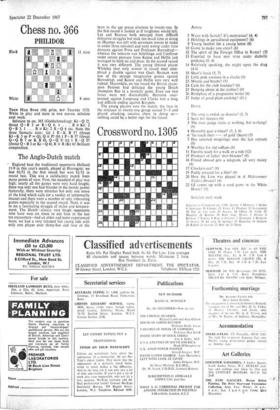Chess no. 366
PHILIDOR
White 11 men 8 men
Touw Hian Bwee (4th prize, BCF Tourney 113). White to play and mate in two moves; solution next week.
Solution to no. 365 (Goldschmeding): Kt – Q 2!, threat Q– B 3 or R– Q 6. 1 . . . R x Kt; 2 Q– B 3. 1 . . . B x Kt; 2 R– Q 6 etc. Note the three thematic tries: (a) 1 R – K B 5? (threat Kt – K 5 or P = Q), Q x P! (b) I P – B 5? (threat Q–Q B 7 or K B 6), Q–Q 3! (c) 1 R–Q 2? (threat Q – B 3 or Kt – Q 4), R X R (Kt 4)! Brilliant composition.
The Anglo-Dutch match
England beat the traditional opponents Holland 11-9 in this year's match, played at Harrogate; we lost 4+15+ in the first round but won 6-113+ in round two. This was a satisfactory match from many points of view. First, the standard of play was high; nearly all the games were very hard fought, there was only one bad blunder in the twenty games (naturally, there were mistakes but only one move of the kind which calls for a verdict of temporarily insane) and there were a number of very interesting games especially in the second round. Next, it was to me a fascinating struggle of styles and tempera- ment. The Dutch—always very tough opponents who have won six times to our, four in the last ten encounters—had an older and more experienced team; we had a very talented but young side with only one player over thirty-five and four of the team in the age group nineteen to twenty-one. In the first round it looked as if toughness would tell; Lee and Basman both emerged from difficult defensive struggles but took too much time in doing so (Basman was left with seventeen moves to make in under three minutes) and went wrong under time pressure against Prins and Professor Barendregt- whereas the veterans van Scheltinga and Cortlever under severe pressure from Keane and Hollis just managed to hold on and draw. In the second round it was very different. The young Oxford player Whiteley (our only winner in round one) com- pleted a double against von Geet; Basman won one of his strange imaginative games against Barendregt, and Keane and Hollis won very well indeed. Meanwhile, on top board the British cham- pion Penrose had defeated the young Dutch champion Ree in a masterly game. Even our two losses were not discreditable. Hartston over- pressed against Langeweg and Clarke lost a long and difficult ending against Kuypers. The young players won the match; the four in the nineteen to twenty-one group scored 5-3 and played attacking creative chess in doing so— nothing could be a better sign for the future.


































 Previous page
Previous page